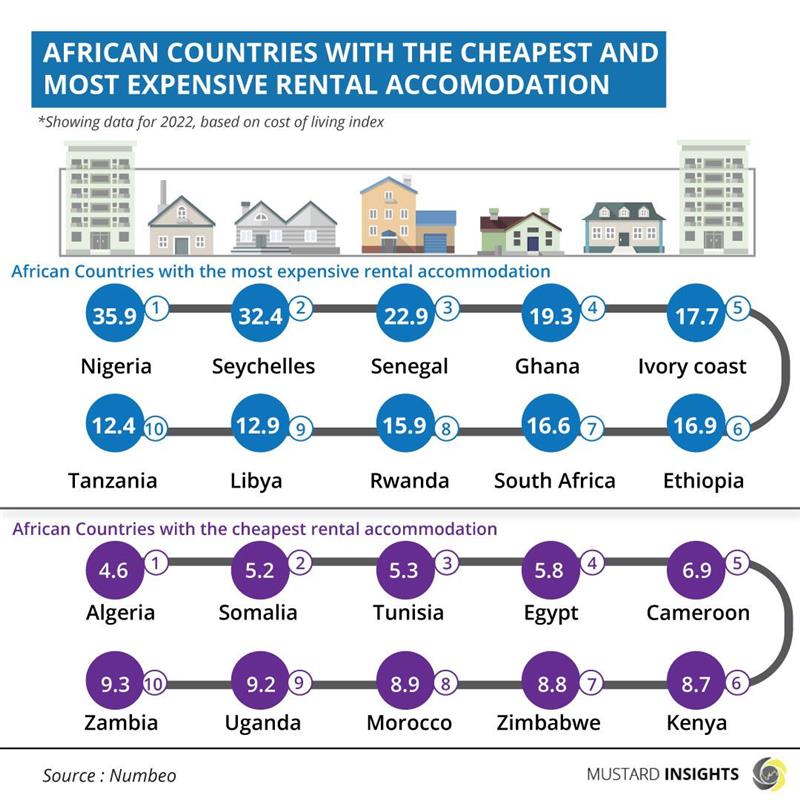The high cost of rental accommodation Nigeria, Ghana, South Africa and other African countries are increasingly becoming worrisome, traceable to rapid urbanization, population explosion, rural-urban drifts and huge housing deficits.

Housing is considered as one of the most important infrastructures needed for the development and sustainability of any nation. It is essentially required for the comfort and longevity any individual. The World Health Organization (WHO) defines housing as any “residential environment which includes, in addition to the physical structure that man uses for shelter, all necessary services, facilities, equipment and devices needed or desired for the physical and mental health and social well-being of the family.”
The provision of quality housing is one of the many roles of any functional government, which in turn signifies how good, or bad the standard of living of any country is. This has been corroborated by the United Nations (UN) under its Sustainable Development Goals (SDG), which ensures access for all persons to adequate, safe, and affordable housing, basic services and upgraded slums by 2030. The UN believes that a high-quality housing sector is one of the benchmarks for socioeconomic growth and development.
In this article, we provided highlights on the African countries with the cheapest and most expensive rental accommodation.
Most Expensive Rental Accommodations in Africa
- Nigeria – 35.9 index score
- Seychelles – 32.4 index score
- Senegal – 22.9 index score
- Ghana – 19.3 index score
- Ivory Coast – 17.7 index score
- Ethiopia – 16.9 index score
- South Africa – 16.6 index score
- Rwanda – 15.9 index score
- Libya – 12.9 index score
- Tanzania – 12.4 index score
Why are they so expensive? / Housing Deficits as A Root Cause
The high cost of rental accommodation in some of these countries is traceable to rapid urbanization, population explosion, influx of people from other cities and most importantly housing deficits. Nigeria, Ghana, South Africa, Ethiopia, Rwanda, all suffer from housing deficits due to their growing population and rapid urbanization. Nigeria has the largest population in Africa with over 210 million but suffers from a huge housing deficit, which in turn has led to a spike in demand. The Central Bank of Nigeria (CBN) in a publication stated that “the housing deficit crisis in Nigeria has worsened in recent times with statistics showing a deficit of at least 17.0 million. There has been a steady rise in the housing deficit, from 7.0 million in 1991 to 14 million in 2010. From the report of the World Bank in 2018, Nigeria requires about 700,000 housing units annually, spanning through a 20-year period to accommodate the rising population.”
The same issue is prevalent in Ghana. The Ghanian Statistical Service (GSS) indicates that, “the country’s housing deficit in the last 50-year period continually witnessed an upward trend from a figure of 1 million to 2.8 million from 1950 to 2010.” However recent data released by the GSS puts “the national housing deficit at 1.8 million, a 33 per cent reduction from the previous 2.8 million”, as of 2022. Although Ghana is actively trying to solve this problem, more is required if they are to totally address the housing deficit.
Ethiopia has a population of 113 million citizens and boast of a Gross Domestic Product (GDP) of 111.27 billion US dollars as of 2021, according to official data from the World Bank. Meanwhile, majority of these citizens live in “poorly built, dilapidated and cramped houses which lack even the basic facilities” such as toilets, with 24% of the households not having any form of toilet facility and 63% using shared pit latrines. Additionally, 25% of the solid waste generated from the city is left unattended (Habitats for Humanity). Only 30% of the current housing stock in country is in a fair condition, with the remaining 70% in need of total replacement. Access to safe drinking water is 49% countrywide, and only 20.7% of the population has access to adequate sanitation (UNICEF).
Rwanda’s case is attributable to high cost of constructions, compounded with costly building materials, while South Africa’s problem can also be attributed to certain factors such as unavailability of land, poor access to housing finance, migration, and urbanization.
Cheapest Rental Accommodations in Africa
- Algeria – 4.6 index score
- Somalia – 5.2 index score
- Tunisia – 5.3 index score
- Egypt – 5.8 index score
- Cameroon – 6.9 index score
- Kenya – 8.7 index score
- Zimbabwe – 8.8 index score
- Morocco – 8.9 index score
- Uganda – 9.2 index score
- Zambia – 9.3 index score
Why are these countries so cheap?
Across these countries, rental accommodation is cheap, driving low cost of living. Compared to the cost of living of the other African countries above, citizens of the countries and migrants find it easy to live in. For example, Algeria’s rent is 87.28% lower than rent in Nigeria, and the cost of living in Algeria is also 13.13% lower than Nigeria (Numbeo).
Thoughts?
We won't share your email address. All fields are required.
